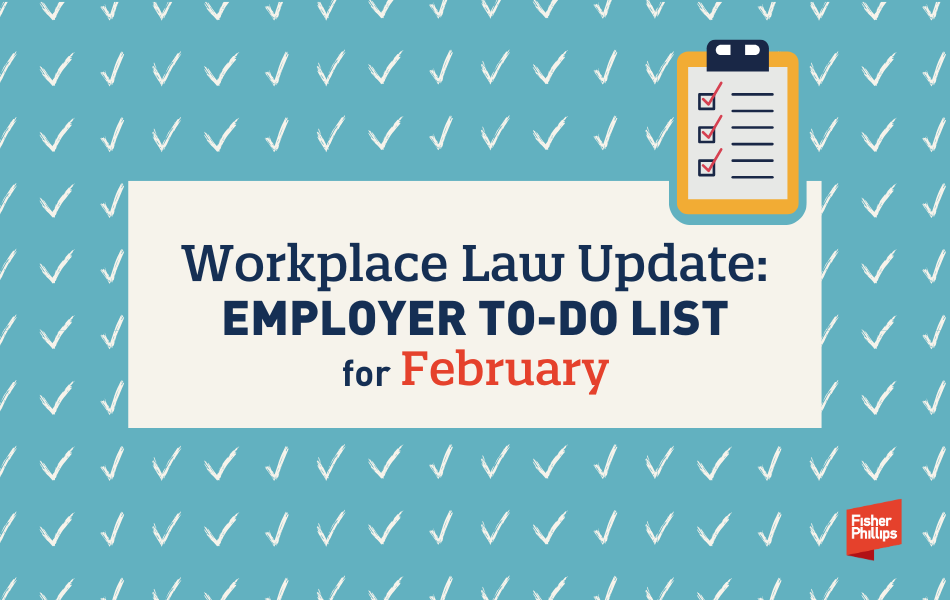Workplace Law Update: 10 Essential Items on Your February To-Do List
Insights
1.31.25
It’s hard to keep up with all the recent changes to labor and employment law, especially given the rapid pace at which the White House acted in the first days of President Trump’s second term. In order to ensure you stay on top of the latest changes and have an action plan for compliance, here is a quick review of some critical developments we tracked in January and a checklist of the essential items you should consider addressing in February and beyond.
|
_____ |
Track changes from workplace watchdogs. President Trump made several unprecedented moves in January that demonstrates a clear shift in the way the federal government will approach labor law, EEO, and anti-bias laws over the course of the next several years. He summarily dismissed NLRB General Counsel Jennifer Abruzzo and Board Member Gwynne Wilcox. He also fired two Democratic members of the EEOC and appointed EEOC Commissioner Andrea Lucas – a vocal critic of DEI programs and other Biden administration policies – as Acting Chair of the Commission. Additionally, Trump issued an executive order announcing that the federal government will recognize only two sexes while rolling back Biden-era EEO workplace guidance on LGBTQ+ harassment. |
|
_____ |
Assess your diversity, equity, and inclusion programs. President Trump issued a far-reaching executive order on January 21 targeting diversity, equity, and inclusion (DEI) initiatives in not only the federal government but also the private sector. While the order creates many unanswered questions and will likely face legal challenges, we put together an Insight explaining what private employers need to know about these new federal anti-DEI initiatives and what you should do now. |
|
_____ |
Coordinate with counsel on affirmative action orders. Just days after President Trump issued an executive order dismantling the race and gender affirmative action obligations that have applied to federal contractors since the 1960s, the Labor Department announced on January 24 that it was ceasing all pending investigations and enforcement activity. This means employers subject to pending cases, conciliation agreements, investigations, and complaints related to the now-rescinded Executive Order 11246 have now received a reprieve, but federal contractors and subcontractors will still need to continue other compliance efforts. Click here for more on this development. |
|
_____ |
Create an action plan in response to sharp immigration policy changes. In the hours after Donald Trump was sworn in as President, his administration started taking immediate action to reshape the country’s immigration policies – and employers need to pay attention given the impact these changes will soon have on the workplace. This Insight will help you cut through the news to identify the specific changes that you need to know about. |
|
_____ |
Keep up with the evolving AI landscape. The White House enacted a sweeping shift in AI policy in January rescinding President Biden’s executive order on artificial intelligence and announcing a massive private-sector-led AI infrastructure investment. Then, President Trump followed up with an executive order on January 23 calling for a group of regulators to craft a new AI policy within six months intended to ensure “global AI dominance.” Meanwhile, at the state level, California and New York are making sure businesses take accountability for AI-driven decisions – and New Jersey issued guidance on January 9 putting employers on notice that AI-driven bias is illegal discrimination. |
|
_____ |
Monitor labor law development. We’ve already mentioned dramatic changes at the NLRB that could introduce uncertainty in labor law enforcement. Now here’s another twist: Just days into the newest Congressional session, a key Republican Senator shocked many employers by pushing for a law that would significantly tilt the playing field to the benefit of unions and labor advocates. Is this the beginning of a true labor revolution that will upend the traditional status quo, a plan destined to go nowhere, or something in between? Here are the seven key sections of the proposal and our thoughts about what to expect in the coming months. You can also click here for our top 10 labor relations predictions for 2025. |
|
_____ |
Get ready for increased OSHA penalties. Employers are facing higher penalties for workplace safety violations in 2025 now that the U.S. Department of Labor has published its listing of annual increases. Here are the key changes you need to know about and steps you can take to ensure you provide a safe workplace for your employees. |
|
_____ |
Consult your state law compliance checklist. With all the news from the federal government, it’s important to remember that you still have workplace obligations at the state and local levels, too. Be sure to check for compliance with any new laws that impact your operations, such as:
You can also click here for a comprehensive look at the key laws that took effect in New York in 2024 or are set to take effect in 2025, as well as new legislation that may be on the horizon. To keep up with all the latest developments, sign up for Fisher Phillips’ Insight System to receive updates directly to your inbox. |
|
_____ |
Track the latest pay transparency trends. Speaking of state laws, blue states are expected to up their game this year in resistance to the Republican trifecta in the White House, Senate, and House – and pay transparency will continue to be one of the hottest topics. Here’s what you need to know about pay transparency laws and five tips for compliance. |
|
_____ |
Review SCOTUS ruling on the standard of proof in overtime exemption cases. The Supreme Court handed businesses a win on January 15 when it weighed in on how much evidence an employer needs to show a court to prove it correctly classified employees as exempt from minimum wage and overtime pay under the FLSA. Click here for the key points you should know about the ruling and what it means for your workplace. |
We will continue to monitor developments related to all aspects of workplace law. Make sure you are subscribed to Fisher Phillips’ Insight System to get the most up-to-date information. If you have questions, contact your Fisher Phillips attorney.
Related People
-
- Lisa Nagele-Piazza
- Lead Content Counsel
Service Focus
- Affirmative Action and Federal Contract Compliance
- AI, Data, and Analytics
- Consumer Privacy Team
- Corporate Compliance and Governance
- Counseling and Advice
- Data Protection and Cybersecurity
- Employee Leaves and Accommodations
- Employers' Rapid Response Team for DHS Raids
- Employment Discrimination and Harassment
- Government Relations
- Immigration
- Labor Relations
- Litigation and Trials
- Pay Equity and Transparency
- Privacy and Cyber
- Reductions in Force (RIFs)
- Wage and Hour
- Workplace Safety and Catastrophe Management

